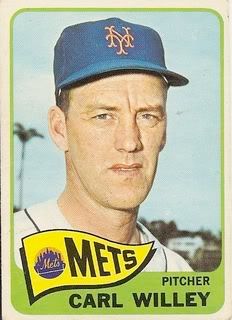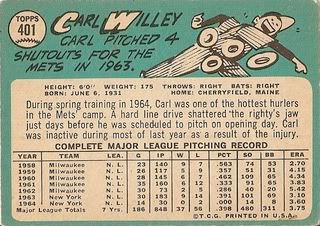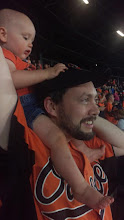
Fun facts about Carl Willey:
-Born in Cherryfield, ME, Carl signed with the Boston Braves in 1951.
-Like many players of his generation, Willey's pro career was interrupted by military service. In 1957, his third year back, he got untracked and won the AAA American Association's MVP award. He was 21-6 for the Wichita Braves, leading the league in victories, and completed 17 of his 32 starts with a 3.24 ERA.
-There was a lot of buzz surrounding the 27-year-old righthander as he began the 1958 season in the Braves bullpen, but he pitched sparingly and was sent back to the minors in May. He returned to Milwaukee several weeks later and shut out the Giants in his first career start, holding them to six hits while striking out seven.
-Remaining in the rotation for the rest of the season, Carl compiled a 9-7 record and a 2.70 ERA, buoyed by a league-leading four shutouts. He added one flawless inning of relief in the World Series, striking out Moose Skowron and Gil McDougald and inducing a flyout from Tony Kubek.
-He spent four more seasons with the Braves but failed to duplicate his early success and never received more than 22 starts in a season. His best year of the four was 1961, and even then his ERA was a mediocre 3.83 and his .333 winning percentage (6-12) was worst on the team.
-Traded to the Mets in 1963, Willey showed improvement during a season that was far from dull (more on that later). He matched his career high with nine wins (but lost 14) and turned in a team-best 3.10 ERA and four shutouts.
-Carl pitched the game of his life on June 23, 1963, holding the Phillies to three base runners (two hits and a hit batter) in a 5-0 victory. However, he was upstaged by eccentric teammate Jimmy Piersall, who celebrated his 100th career home run by circling the bases backward!
-He hit two home runs in his career, and the second one helped to earn him a win. On July 15, 1963, Carl faced Houston and gave up two runs in the top of the second inning to put the Mets in a hole. They mounted a rally in their next at-bat, and Joe Hicks' one-out double made it a 2-1 game. With one out and two runners in scoring position, the Colt .45s chose to intentionally walk shortstop Larry Burright to bring Willey (who would hit .099 for his career) to the plate. He tagged opposing starter Ken Johnson for a grand slam to give himself a 5-2 lead! The unlikely slugger ended up making it through just five innings while allowing four runs, but the Mets broke the game open and triumphed 14-5.
-Carl lasted only three seasons with the Mets, pitching in 27 games total during his final two years. He was hampered by a sore arm and also lost time due to a Gates Brown line drive that fractured his jaw in the spring of 1964. In parts of eight seasons he was 38-58 with a 3.76 ERA and 11 shutouts.
-He returned home to Maine after retiring, and later scouted for the Phillies. He died of lung cancer in July 2009 at age 78.



A line drive resulting in a fractured jaw-- now that had to hurt! It was hard enough back then just to be a member of the Mets...
ReplyDeleteAnon - Gates Brown probably did him a favor...that's a lot less Mets games Carl had to see that year.
ReplyDeleteNobody ever called him 'Carl' Willey. It was always 'Carlton' Willey. Topps liked to do stuff like that. Besides them who ever referred to Roberto Clemente as 'Bob'?
ReplyDeleteI agree about Willey; I had always heard it was Carlton.
ReplyDeleteI believe Bob Prince, the Pirates long-time announcer, referred to Clemente as "Bob." I seem to recall hearing him do that when watching replays of Game 7 of the 1960 World Series.
Bob - Thanks for the info! I guess we're fortunate that Topps doesn't still do this...I could only imagine "Al" Rodriguez and "Bob" Cano cards!
ReplyDeleteKevin, he was glum because it was 1965, and he was on the Mets!
ReplyDelete